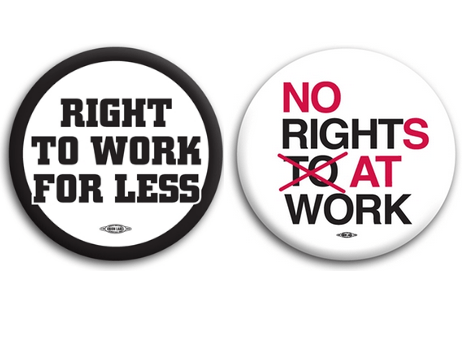The Economist was out with an article last week that showed that while wage growth has been horrible nationwide across the country since the Great Recession, one state had fared particularly badly: Delaware.
From 2009 to 2014, [Delaware] was the only state in which hourly and weekly earnings dropped in cash terms (see chart).
At first glance, this is puzzling. Unemployment in Delaware, at 4.8%, is well below the national average; many would expect such a tight labour market to result in rising wages. Moreover, the state is famously kind to business. Thanks to benign company laws and low taxes, there are more businesses registered in Delaware than there are people. More than 50% of all publicly traded firms in America have chosen the state as their legal home. Last year roughly 170,000 business entities formed there, a new record. A quarter of Delawareans work in finance or business services, a higher proportion than in any other state. Such vocations typically pay well.
But dig deeper, and problems appear. In recent years Delaware’s business-services industry has not looked so hot. In company litigation, its courts have lost out to rivals, particularly federal ones. Excessive litigation encourages companies to move. And Wilmington, the largest city in the state, is losing its appeal as a place to do business because of its high crime rate. Downtown is eerily quiet, even on business days. At the heavily policed railway station, a helpful video shows what to do if an armed madman launches an attack.
All this has taken a toll. The number of full-blown public and private corporations registered in Delaware is 11% lower than it was in 2000. (The number of smaller outfits has shot up, but these generate less juicy work.) Small wonder, then, that over the same period employment in Delaware’s professional and business-services sector has dropped by a tenth. Wages in that industry have fallen for the past few years. They have also tumbled in the financial sector, which has struggled recently with low profits. Delaware’s moneymen are earning 25% less per hour than they did before the financial crisis.
Add in the fact that Delaware has become a retirement haven due to its low low low taxes, with the state’s population over 65 growing by 7% between 2010 and 2013, and forecast to become one of the fastest-ageing states in the next few decades; and add in the fact that the low wage sector, also known as the leisure and hospitality section has also grown by 7% over the same time period, and you have a good recipe for lowering wages. So where did the Economist go for the ANSWER to this problem. Why of course, they went to John Stapleford of the Caesar Rodney Institute. LOLZ. Stapleford’s answer: End Unions and pass a Right to Work for Less law.
Cue Senator Lavelle, who last week introduced SB 54, the Right to Work for Less bill that would make it harder for unions to organize and would lower wages for all workers, so as to attract manufacturing business back to the state, because for some reason manufacturers cannot pay a living wage to its workers and protect their rights and safety, and still make a profit, all evidence to the contrary ignored.
Needless to say, the legislation is not winning much support beyond the anti-worker and anti-middle class Republican Party.
Sam Lathem, president of the Delaware AFL-CIO, the umbrella organization representing Delaware unions, called Lavelle’s legislation a “desperate reach” that would lead to lower wages. “We need to find a way to re-create and grow the middle class. Right-to-work isn’t going to do that,” Lathem said. […]
Markell, a Democrat, appears poised to oppose the legislation. A spokeswoman said available studies on whether right-to-work legislation creates jobs are “inconclusive at best.”
“Gov. Markell remains focused on efforts that employers tell him are most important for job and economic growth, such as providing training for a skilled workforce and spurring innovation,” spokeswoman Kelly Bachman said.
You want to know why Democrats and liberals do not trust Governor Markell when it comes to economics and worker’s rights? It’s that answer right there. The hedging. But I digress.
You know what will raise wages right away? Pass Senator Marshall’s Minimum Wage Increase Bill (SB 39) that would raise the minimum wage by 50 cents a year over the next four years until it is $10.25, and after that tie it to COLA thereafter.
